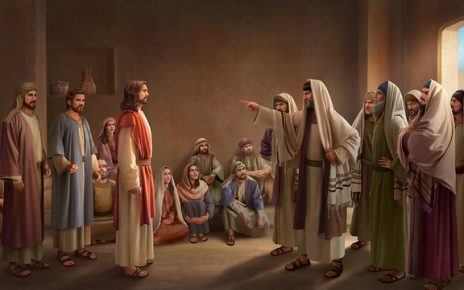As for why the Lord Jesus worked on the Sabbath day, let’s read a passage, “When the Lord Jesus came, He used His practical actions to communicate to people: God had departed the Age of Law and had begun new work, and this new work did not require observation of the Sabbath; when God came out from the confines of the Sabbath day, this was just a foretaste of His new work, and His truly great work was continuing to play out. When the Lord Jesus began His work, He had already left behind the shackles of the Age of Law, and had broken through the regulations and principles from that age. In Him, there was no trace of anything related to the law; He had cast it off entirely and no longer observed it, and He no longer required mankind to observe it. So here you see that the Lord Jesus went through the corn fields on the Sabbath; the Lord did not rest, but was outside working. This action of His was a shock to people’s conceptions and communicated to them that He no longer lived under the law, and that He had left the confines of the Sabbath and appeared in front of mankind and in their midst in a new image, with a new way of working. This action of His told people that He had brought with Him new work that began with going out from the law and going out of the Sabbath. When God carried out His new work, He no longer clung to the past, and He was no longer concerned about the regulations of the Age of Law. Neither was He affected by His work in the previous age, but He worked as usual on the Sabbath and when His disciples were hungry, they could pick ears of corn to eat. This was all very normal in God’s eyes. God could have a new beginning for much of the work that He wants to do and the things that He wants to say. Once He has a new start, He neither mentions His previous work again nor continues it. For God has His principles in His work. When He wants to begin new work, it is when He wants to bring mankind into a new stage of His work, and when His work has entered a higher phase. If people continue to act according to the old sayings or regulations or continue to hold fast to them, He will not remember or praise this. This is because He has already brought new work, and has entered a new phase of His work. When He initiates new work, He appears to mankind with a completely new image, from a completely new angle, and in a completely new way so that people can see different aspects of His disposition and what He has and is. This is one of His goals in His new work. God does not hold on to the old or take the beaten path; when He works and speaks it’s not as prohibitive as people imagine. In God, all is free and liberated, and there is no prohibitiveness, no constraints—what He brings to mankind is all freedom and liberation. He is a living God, a God who genuinely, truly exists. He is not a puppet or a clay sculpture, and He is totally different from the idols that people enshrine and worship. He is living and vibrant and what His words and work bring to humans is all life and light, all freedom and liberation, because He holds the truth, the life, and the way—He is not constrained by anything in any of His work. … Thus, the Lord Jesus could openly go out and work on the Sabbath because in His heart there were no rules, and there was no knowledge or doctrine that originated from mankind. What He had was God’s new work and His way, and His work was the way to free mankind, to release them, to allow them to exist in the light, and to allow them to live”.
This passage states very clearly why the Lord Jesus worked on the Sabbath day. When God works, He does not cling to old ways of doing things and He does not travel down old roads. God always does newer and higher work according to the needs of corrupt mankind. When He does a new work, God no longer holds to previous work, and if people hold to previous practices then they are clinging to rules. Only by giving up old rules and practices and closely following the footsteps of God’s work can people attain His salvation. In the Age of Law, for example, through Moses, God proclaimed the laws and commandments to guide mankind’s life on earth, and He required that man observe the laws and commandments and that they must keep the Sabbath day. This was because the people at that time didn’t know how to conduct their lives, and they knew nothing about what worshiping God was, about how to worship God or when to work, and so on. God didn’t wish to see mankind busying themselves all day long, working from the break of day and then resting at sundown, living only for the sake of food, clothing and shelter and raising their families. And so, He proclaimed His laws and commandments for man to observe, and He set the Sabbath day for man, requiring that they work six days, and then stop all work on the seventh day in order to come before God and worship Him. But at the end of the Age of Law, mankind was becoming more and more corrupted by Satan and, even though they appeared to keep the Sabbath day and they appeared to worship and praise God on the Sabbath, they no longer had any true worship of God in their hearts. Even though they kept the Sabbath day, it was still just a kind of rule or ritual, without any meaning whatsoever. Therefore, when the Lord Jesus came to work, He expressed the way of repentance in light of man’s needs and He no longer enjoined people to keep the rules and practices of the Sabbath day. Instead, He led people to leave behind the laws and the Sabbath day, and He proposed new requirements for man: To worship God in spirit and in truth. In this way, people were able to have a newer, higher path of practice and, only by letting go of previous rules and practices and practicing in accordance with God’s new requirements could they enjoy the peace and joy bestowed by the Lord and live under God’s care and protection. From the outside, it looked as though the Lord Jesus was abandoning the laws by no longer keeping the Sabbath day, but in essence He was fulfilling the laws, causing people to move on from keeping rules and rituals to worshiping God in spirit and in truth. This was a more profound practice and entry into worshiping God that enabled people to be closer and more intimate with the heart of God. If the Lord had not personally led His disciples to leave the Sabbath day behind them, then no one would have been able to move beyond the constraints of the laws and would even have been condemned and punished for violating the laws. Only by God Himself continually doing new work were people able to have a new path of practice and obtain the liberation and freedom of the spirit. From God’s work, we can see that God is the true and living God, and that with God there are no rules and no taboos. God is not limited by laws or rules when He performs a new work, and He does not cling to old work. God is ever new and never old, and is always leading man into a newer, higher realm. When God performed His new work, He did not cling at all to old rules or practices; He worked amongst man in an entirely new way, thus enabling them to have a newer path of practice and, ultimately, He saved people from the laws and allowed them to live before Him in freedom and liberation, and to attain His salvation.
We can see from all this that every single thing God does has a profound meaning, and that they are all filled with the love God has for us mankind. Therefore, when God performs a new work, whether God’s work tallies with our notions and imaginings or not, or whether we understand it or not, we cannot rely on our notions and imaginings and use God’s previous work to delimit His new work. God’s wisdom is so wondrous and unfathomable; no matter what God does, it is to better save mankind, and behind it all lies God’s will and His painstaking efforts. We—corrupt mankind—cannot possibly fathom God’s work. All we can do is seek and accept God’s work with a heart of reverence, for only in this way will we be able to win God’s approval and blessings.



